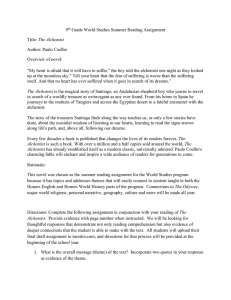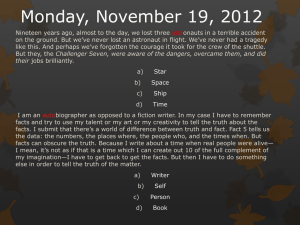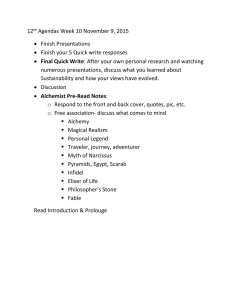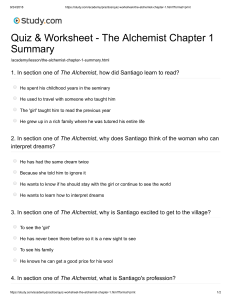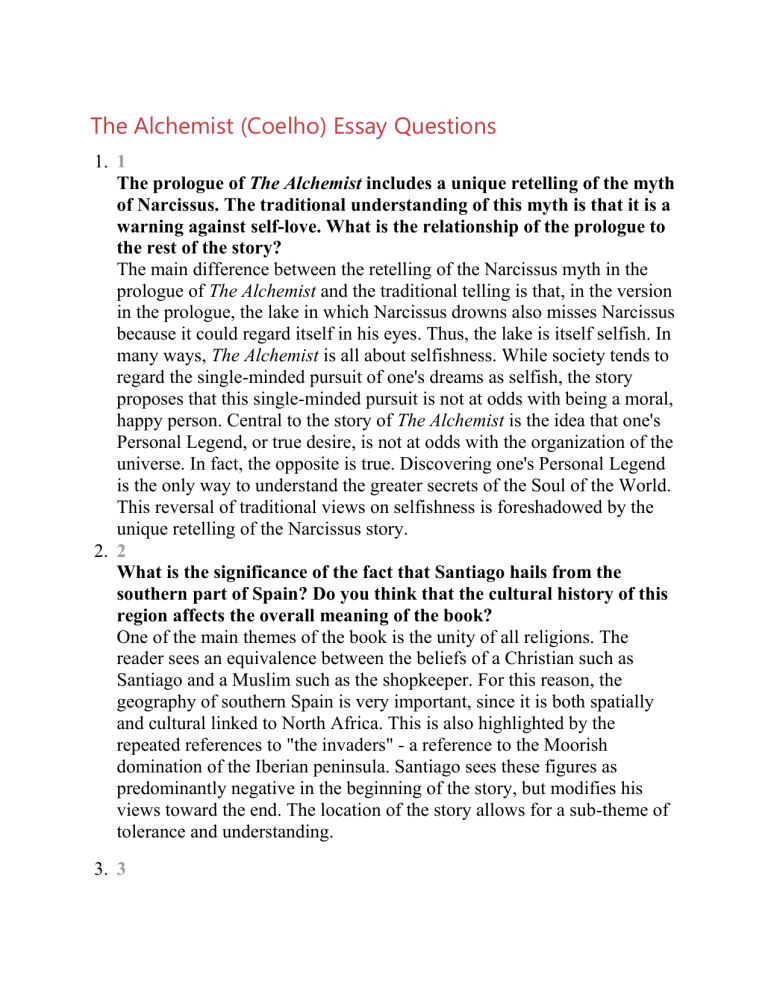
The Alchemist (Coelho) Essay Questions 1. 1 The prologue of The Alchemist includes a unique retelling of the myth of Narcissus. The traditional understanding of this myth is that it is a warning against self-love. What is the relationship of the prologue to the rest of the story? The main difference between the retelling of the Narcissus myth in the prologue of The Alchemist and the traditional telling is that, in the version in the prologue, the lake in which Narcissus drowns also misses Narcissus because it could regard itself in his eyes. Thus, the lake is itself selfish. In many ways, The Alchemist is all about selfishness. While society tends to regard the single-minded pursuit of one's dreams as selfish, the story proposes that this single-minded pursuit is not at odds with being a moral, happy person. Central to the story of The Alchemist is the idea that one's Personal Legend, or true desire, is not at odds with the organization of the universe. In fact, the opposite is true. Discovering one's Personal Legend is the only way to understand the greater secrets of the Soul of the World. This reversal of traditional views on selfishness is foreshadowed by the unique retelling of the Narcissus story. 2. 2 What is the significance of the fact that Santiago hails from the southern part of Spain? Do you think that the cultural history of this region affects the overall meaning of the book? One of the main themes of the book is the unity of all religions. The reader sees an equivalence between the beliefs of a Christian such as Santiago and a Muslim such as the shopkeeper. For this reason, the geography of southern Spain is very important, since it is both spatially and cultural linked to North Africa. This is also highlighted by the repeated references to "the invaders" - a reference to the Moorish domination of the Iberian peninsula. Santiago sees these figures as predominantly negative in the beginning of the story, but modifies his views toward the end. The location of the story allows for a sub-theme of tolerance and understanding. 3. 3 Fatima, Santiago's love interest, defines herself by her resignation to and support of Santiago's quest. What do you think the narrative is trying to say about the role of women or the role of love in general? Pursuing one's love interests as well as one's personal desires can often present a conflict. In The Alchemist, though, this conflict is alleviated by the fact that the two things need not be mutually exclusive. The primary purpose of one's life is one's Personal Legend. Once one identifies that, identifying true love is a relatively simple matter. True love is that love which does not get in the way of pursuing the Personal Legend. We must conclude, then, that love, although a powerful force in The Alchemist, is not primary. It is secondary to the Personal Legend. In the case of Fatima, she recognizes that Santiago must complete his mission or else he will not be living up to his potential. While this seems to relegate her to a supporting role, it is suggested that this is what she truly wants, and what is accepted by her community. Thus, in a way, she is also fulfilled. 4. 4 While Santiago's quest yields significant spiritual insights, its original motive is monetary gain. What is the narrative of The Alchemist trying to say about the relationship between material wealth and spirituality? The Alchemist suggests that the line between spiritual treasure and material treasure is not that fixed. While the relationship between the gold that Santiago finds and the spiritual discoveries he makes is largely metaphorical, the reader does see that the most important thing is not what you want, but just that you want that thing with all of your heart. In Santiago's case, that happens to be treasure. In the scheme of The Alchemist one can have both material and spiritual wealth. 5. 5 The Alchemist is clearly a novel about spiritual growth. Do you think that its message is at odds with organized religion? The novel espouses a kind of ecumenicist religion, wherein all religions are–at their core–one. The central ideas which bind these religions, Christianity and Islam in the case of the book, are a monotheistic God and the fact that that God has a certain fate determined for each person. The novel is also pantheist, in that each person's personal soul is part of the Soul of the World (a term which is interchangeable with God in this sense). God is not separate from us, but is rather the conjoined souls of all existence. The novel does not expressly go against organized religions in this sense, but it does show a lack of emphasis on certain elements of organized religion (such as ritual, hierarchy, etc.). 6. 6 Tradition plays a major role in Santiago's personal life and in the life of the people he meets in his travels. Describe the different viewpoints that the novel presents on tradition. There are two very different views of tradition put forth in The Alchemist. The novel begins with Santiago leaving his traditional home and the role that his family has chosen for him–the priesthood–in order to pursue his treasure. This seems to suggest that one's own Personal Legend is more important than tradition. On the other hand, the tribes in the desert repeatedly fall back on what they simply refer to as "The Tradition." This is a body of knowledge which tells them when to go to war, what visions to trust, etc. Thus we see here a culture that values tradition highly. 7. 7 When Santiago is lost and alone in Tangiers, the owner of the crystal shop offers him a position at his shop. What does Santiago learn from his time at the crystal shop? The owner of the crystal shop teaches Santiago that one of the principle things which endangers the pursuit of a dream is one's own fear of achieving it. The crystal shop owner wants to go to Mecca, but also fears that if he does so he might lose his reason for living. Up until that point, Santiago has only been acquainted with exterior interference with achieving one's dreams, such as being robbed. 8. 8 Although Melchizedek plays a major role in Santiago's decision to continue in search of his treasure, he only appears once in the book. Does he have any connection with the other characters that appear in the book? While Melchizedek only appears once in The Alchemist he does prefigure some of the other characters in the story. He explicitly tells Santiago that he sometimes appears as other things besides the King of Salem. For example, he tells Santiago a story wherein he appears as a stone. Santiago also recognizes elements of Melchizedek's personality and philosophy in other characters, such as the shopkeeper and the Alchemist. 9. 9 How do you think the style of The Alchemist affects its meaning? The novel is written in a very plain style, using short declarative sentences and few modifiers such as adjectives and adverbs. The book also makes wide use capitalized terminology and magical situations such as visions and communication with the Wind, Desert, etc. These combined factors make the didactic thrust of the story apparent. By simplifying the psychology of the characters and featuring characters with no names (the Englishman, the Alchemist, etc.), the story takes on a more universal appeal.

